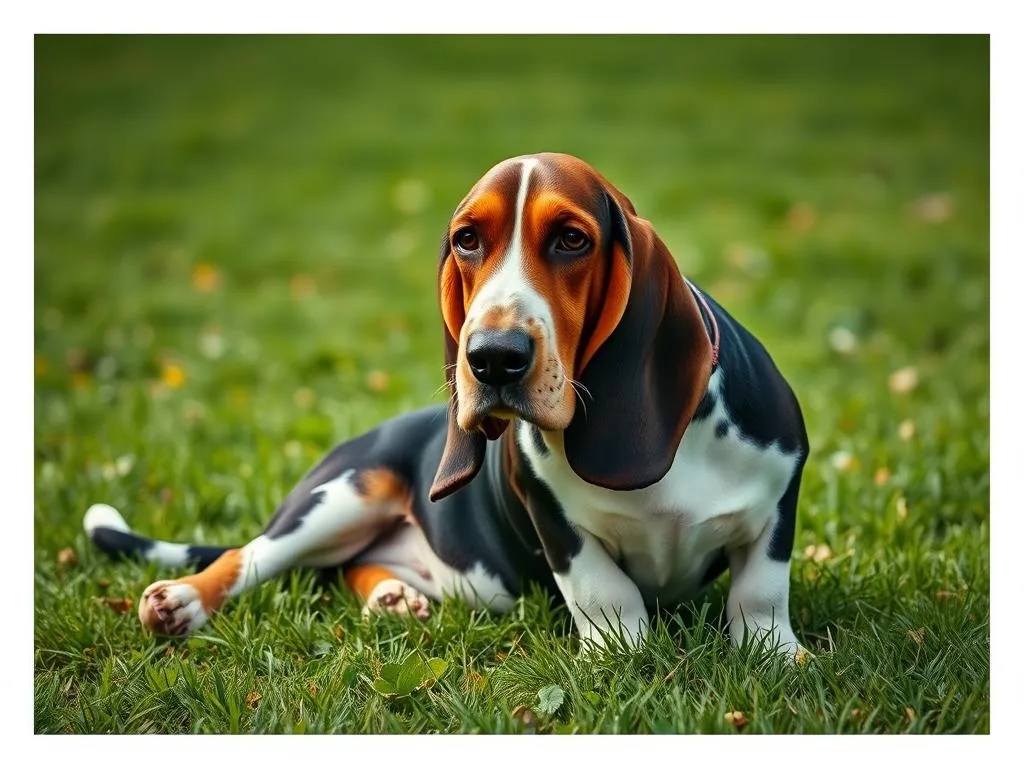
Introduction
Basset Hounds are a distinctive breed known for their long ears, droopy eyes, and short legs. Originating from France and bred for hunting small game, these dogs have unique physical characteristics that set them apart. With their excellent sense of smell and gentle demeanor, they have become beloved family pets.
Despite their charm, Basset Hounds often face the stereotype of being lazy. This misconception can lead to misunderstandings about their needs and care. It’s essential to delve into their behavior and health care requirements to dispel this myth and promote better understanding.
Understanding Basset Hound Behavior
Breed Characteristics
Basset Hounds are medium-sized dogs, typically weighing between 40 to 65 pounds. Their most notable features are their long, droopy ears, which help capture scent particles, and their loose skin, which gives them a distinctive appearance. The breed’s coat is short and can come in various colors, including tri-color (black, white, and tan) and lemon (light tan and white).
In terms of temperament, Basset Hounds are known for their friendly and laid-back nature. They are gentle, affectionate, and good with children, making them great family pets. While they can be independent thinkers, they are also social animals that enjoy the company of both humans and other dogs.
Activity Level and Energy
When it comes to energy levels, Basset Hounds are often perceived as being low-energy dogs. However, this is a bit of a misconception. While they do have a more relaxed demeanor compared to some other breeds, they still require regular exercise to stay healthy and happy.
In comparison to more active breeds, such as Border Collies or Labrador Retrievers, Basset Hounds may seem sluggish. They enjoy leisurely walks and short bursts of play but are not as high-energy as some other breeds.
Are Basset Hounds Lazy?
The term “lazy” in the context of dog behavior can be misleading. Basset Hounds do not exhibit laziness; instead, they have a unique approach to energy conservation. Their body structure—a barrel-shaped torso and short legs—means that they are not built for high-intensity exercise.
Factors contributing to this perception of laziness include their slow-paced movements and preference for lounging around. However, this behavior is simply a natural adaptation to their physical characteristics. Additionally, Basset Hounds thrive on routine, and a balanced schedule of activity and rest is crucial for their well-being.
Health Care Needs for Basset Hounds
Common Health Issues
Basset Hounds are predisposed to certain health issues that potential owners should be aware of:
-
Hip Dysplasia: This genetic condition affects the hip joint and can lead to arthritis and mobility issues. Regular veterinary check-ups and maintaining a healthy weight are essential to manage this risk.
-
Ear Infections: Due to their long ears, Basset Hounds are prone to ear infections. Regular cleaning of their ears can help prevent this issue.
-
Obesity: Basset Hounds love food and can easily become overweight if not monitored. Obesity can exacerbate other health problems and lead to a decreased quality of life.
Regular Veterinary Care
Routine veterinary visits are crucial for Basset Hounds. Regular check-ups help in early detection of health issues, ensuring that any potential problems are addressed promptly.
Vaccinations are essential to protect against common canine diseases. A typical vaccination schedule includes:
- Core vaccines (distemper, parvovirus, rabies)
- Non-core vaccines (depending on lifestyle and environmental factors)
Nutrition and Diet
Basset Hounds have specific dietary needs that must be addressed for their overall health. A balanced diet consisting of high-quality dog food is vital. Here are some key points:
-
Dry vs. Wet Food: Both types can be suitable, but dry kibble is generally more beneficial for dental health.
-
Homemade Diets: If considering homemade meals, consult with a veterinarian to ensure nutritional adequacy.
-
Portion Control: Due to their propensity for obesity, it’s vital to measure food portions and avoid excessive treats.
Exercise Requirements
Daily Exercise Recommendations
Basset Hounds require daily exercise, but their needs are generally less intense than those of more active breeds. Aim for at least 30 minutes to an hour of moderate activity each day. Suitable exercises include:
-
Leisurely Walks: A couple of short walks can help meet their needs without overexertion.
-
Playtime: Engaging in light play, such as fetch or tug-of-war, can provide both physical and mental stimulation.
Mental Stimulation
Mental exercise is just as important as physical activity for Basset Hounds. They are intelligent dogs that benefit from engaging their minds. Consider incorporating:
-
Interactive Toys: Puzzle toys that dispense treats can keep them occupied and mentally stimulated.
-
Scent Games: Basset Hounds have an excellent sense of smell, making scent-based games ideal. Hide treats around the house and encourage them to find them.
Signs of Insufficient Exercise
When Basset Hounds do not receive enough exercise, they may exhibit various behavioral issues. Common signs include:
-
Excessive Barking: A bored dog may bark more frequently to get attention.
-
Chewing: Lack of physical activity can lead to destructive chewing as they seek outlets for their energy.
Grooming and Care
Grooming Needs
Basset Hounds have relatively low grooming needs due to their short coat. However, regular care is still necessary:
-
Bathing Frequency: Bathe them as needed, usually every few months or when they become particularly dirty.
-
Ear Cleaning and Nail Trimming: Regularly check and clean their ears to prevent infections, and keep their nails trimmed to avoid discomfort.
Skin Care
Basset Hounds can experience skin issues, including hot spots and allergies. To prevent these:
-
Regular Inspections: Check their skin for any signs of irritation or infection.
-
Moisturizing Products: Consult with a veterinarian if you notice dry skin or rashes.
Dental Care
Dental hygiene is crucial for Basset Hounds. Regular dental care helps prevent periodontal disease, which can affect their overall health. Recommended practices include:
-
Brushing Teeth: Brush their teeth several times a week with dog-safe toothpaste.
-
Dental Chews: Providing dental chews can also help maintain oral health.
Socialization and Training
Importance of Early Socialization
Basset Hounds benefit greatly from early socialization. Introducing them to various environments, people, and other animals will help them grow into well-adjusted adults.
- Tips for Effective Socialization: Arrange playdates with other dogs, visit dog parks, or take them to pet-friendly events to enhance their social skills.
Training Tips
Training Basset Hounds can be a rewarding experience, though patience is key due to their stubborn nature. Basic commands such as sit, stay, and come should be taught using positive reinforcement techniques.
Overcoming Stubbornness
Basset Hounds may not always be eager to obey commands, but consistent training can yield positive results. Consider these strategies:
-
Short Training Sessions: Keep sessions brief and engaging to maintain their focus.
-
Positive Reinforcement: Reward good behavior with treats and praise to encourage compliance.
Senior Basset Hound Care
Aging Signs to Watch For
As Basset Hounds age, they may develop specific health issues, including joint problems and decreased mobility. Keep an eye out for:
-
Behavioral Changes: Increased lethargy or reluctance to engage in activities can signal health concerns.
-
Mobility Issues: Difficulty in climbing stairs or getting up from a resting position may indicate pain or discomfort.
Adjusting Care for Seniors
Caring for senior Basset Hounds requires some adjustments:
-
Dietary Adjustments: Older dogs may need a diet formulated for seniors to support joint health and weight management.
-
Exercise Modifications: Tailor their exercise routine to be gentler, focusing on low-impact activities to accommodate any physical limitations.
Conclusion
Understanding the behavior and health care needs of Basset Hounds is essential for any owner. These affectionate dogs deserve proper care that addresses their unique characteristics, from their perceived laziness to their specific health issues.
By being proactive in their health care, providing appropriate exercise, and ensuring regular grooming and training, you can help your Basset Hound live a long, happy, and healthy life. Embrace the quirks of this breed, and appreciate the joy they bring to our lives.









